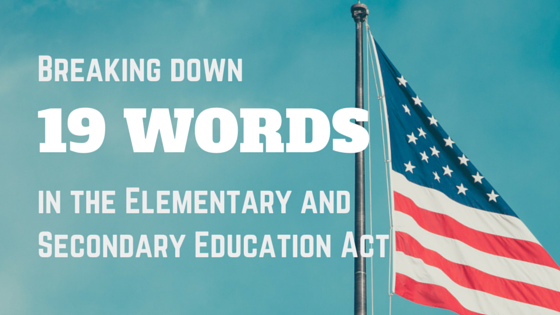ESEA cleared a major hurdle last with an 81-17 bi-partisan vote in on the Senate floor. Now it’s on to conference, where Members in the House will try and hash out the thousands of big and small differences between the bills.
The good news is, they’ve already agreed on one important phrase-nineteen words—that will leave a mark on charter school accountability across the country:
“The accountability provisions under this act shall be overseen for charter schools in accordance with State charter school law”
More often than not, no one understands what this phrase does and why it is important for authorizers and charter schools. So let’s break this phrase down into what it means for authorizing practice, how it interacts with testing, and how it translates into more accountability for charter schools.
- For authorizing practice, it means charter agreements generally win out over traditional state intervention. This provision means that authorizers can largely keep enforcing charter agreements, instead of placing a charter school in a state intervention scheme. Why wouldn’t we want charter schools in the traditional state intervention scheme, you ask? Because a state intervention scheme actually often gets in the way of using the regular state charter law to close a charter school. Perversely, in practice, the state intervention laws can keep a failing charter school open for longer than if an authorizer had enforced the charter agreement and closed the failing school in the first place.
- For testing, it means federally-mandated testing is still required. Assessments are not the same as accountability. Charter schools are currently required to comply with all federal testing requirements. They must continue to do so in both bills, meeting the same grade level and school or district level reporting requirements. It is an authorizer’s responsibility to make sure charter schools are meeting these obligations and to impose swift consequences if a school is not.
- For accountability, it means it is time to double down on state charter school law. This clause, quite literally, makes a state charter school law the first line of offense for charter school accountability. It is where ESEA says a state should turn to for charter school accountability. As such the strength and enforceability of your state charter school law, as well as its accountability provisions, is paramount for charter school quality. Some states may choose to modify their state charter law to explicitly and thoughtfully incorporate charter schools into their statewide school accountability system, while others will continue to defer solely to existing charter school law for accountability. In either scenario, Congress is placing trust in states to ensure their law, and their authorizers, are setting high standards for every charter school and enforcing those standards with on-the-ground charter school accountability. State policymakers across the nation must take this commitment to heart and ensure authorizers continue to renew, revoke and carry out their jobs effectively.
As authorizers, it is our responsibility to make sure that we keep earning an “A” in accountability. Congress is counting on us to follow the letter and spirit of our charter school laws and enforce rigorous accountability for our schools now and in the future. Because if we don’t, they may not give us the same chance the next time around.



